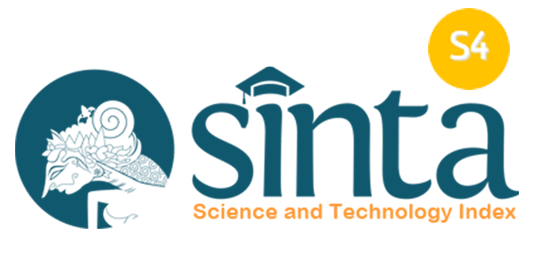PENERAPAN METODE K-MEDOID DALAM PENGELOMPOKAN STATUS EKONOMI MASYARAKAT PADA KECAMATAN TALANG EMPAT
Abstract
Abstract
Talang Empat District is one of the sub-districts in Central Bengkulu Regency, Bengkulu Province. Every year the Talang Empat District Office will record population data for data archiving and reporting. The economic capacity of each community is different, some have high economic status, some have medium, and some have low.
The application of the K-Medoid Method in grouping the economic status of the community in Talang Empat District can help staff/employees of the Talang Empat District Office in managing population data in Talang Empat District, especially with regard to the economic status of the population, and can also help provide information on the results of grouping population data based on status. The economy has been divided into 3 groups, namely high, medium and low. Based on the data used as many as 90 residents in Kembang Seri Village, Taba Pasemah Village, and Nakau Village, Talang Empat District, Central Bengkulu Regency, the results showed that the number of residents in Cluster I (High Economic Status) was 14 residents with a percentage of 15.6%, Cluster II (Medium Economic Status) has 44 residents with a percentage of 48.9%, and Cluster III (Low Economic Status) has 32 residents with a percentage of 35.6%.Based on the black box testing that has been carried out, the results obtained are that the functionality of the application runs as expected and the application is able to display the results of grouping population data into 3 clusters according to the data collection year chosen according to the K-Medoid Method.
Keywords: K-Medoid Method, Economic Status, Talang Empat District
Full Text:
PDFReferences
Enterprise, J., 2019. Belajar Pemrograman Dengan Visual Studio. Jakarta: PT. Elex Media Komputindo..
Febianto, N. I. & Palasara, N. D., 2019. Analisis Clustering K-Means Pada Data Informasi Kemiskinan di Jawa Barat Tahun 2018. Jurnal Sisfokom, Volume Vol.8 No.2 2019..
.Firman, A., 2019. Analisis dan Perancangan Sistem Informasi. Surabaya: Penerbit Qiara Media.
Hanief, S. & Jepriana, I. W., 2020. Konsep Algoritma dan Aplikasinya Dalam Bahasa Pemrograman C++. Yogyakarta: Penerbit ANDI.
Hardiansyah, A. D. & Dewi, C. N. P., 2020. Perancangan Basis Data Sistem Informasi Perwira Tugas Belajar (SIPATUBEL) Pada Kementrian Pertahanan. Jakarta, Senamika ISBN.978-623-93343-1-4.
Helmud, E., 2021. Optimasi Basis Data Oracle Menggunakan Complex View Studi Kasus : PT. Berkat Optimis Sejahtera (PT.BOS) Pangkalpinang. Jurnal Informatika, Volume Vol.7 No.1 ISSN.2407-1730
Santoso & Nurmalina, R., 2017. Perencanaan dan Pengembangan Aplikasi Absensi Mahasiswa Menggunakan Smart Card Guna Pengembangan Kampus Cerdas (Studi Kasus Politeknik Negeri Tanah Laut). Jurnal Integrasi , Volume Vol.9 No.1 . E-ISSN : 2548-9828.
Wahyudi, M., Masitha, Saragih, R. & Solikhun, 2020. Data Mining : Penerapan Algoritma K-Means Clustering dan K-Medoids Clustering. Medan: Penerbit Yayasan Kita Menulis
Zein, A. et al., 2023. Konsep Dasar Pengenalan Database Rumun Ilmu Komputer. Batam: Penerbit Yayasan Cendikia Mulia Mandiri.
Prianto, C. & Bunyamin, S., 2020. Panduan Pembuatan Aplikasi Clustering Gangguan Jaringan Menggunakan Metode K-Means Clustering. Cetakan Pertama penyunt. Bandung: Penerbit Kreatif Industri Nusantara.
DOI: http://dx.doi.org/10.24014/rmsi.v10i2.30587
Refbacks
- There are currently no refbacks.








